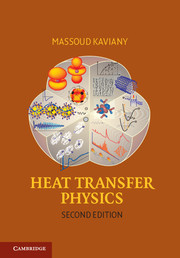Book contents
- Frontmatter
- Dedication
- Contents
- Preface
- Acknowledgments
- 1 Introduction and Preliminaries
- 2 Molecular Orbitals/Potentials/Dynamics and Quantum Energy States
- 3 Carrier Energy Transport and Transformation Theories
- 4 Phonon Energy Storage, Transport, and Transformation Kinetics
- 5 Electron Energy Storage, Transport, and Transformation Kinetics
- 6 Fluid Particle Energy Storage, Transport, and Transformation Kinetics
- 7 Photon Energy Storage, Transport, and Transformation Kinetics
- APPENDIX A Tables of Properties and Universal Constants
- APPENDIX B Derivation of Green–Kubo Relation
- APPENDIX C Derivation of Minimum Phonon Conductivity Relations
- APPENDIX D Derivation of Phonon Boundary Resistance
- APPENDIX E Derivation of Fermi Golden Rule
- APPENDIX F Derivation of Equilibrium, Particle Probability Distribution Functions
- APPENDIX G Phonon Contributions to the Seebeck Coefficient
- APPENDIX H Monte Carlo Method for Carrier Transport
- APPENDIX I Ladder Operators
- Nomenclature
- Abbreviations
- Glossary
- References
- Index
APPENDIX E - Derivation of Fermi Golden Rule
Published online by Cambridge University Press: 05 June 2014
- Frontmatter
- Dedication
- Contents
- Preface
- Acknowledgments
- 1 Introduction and Preliminaries
- 2 Molecular Orbitals/Potentials/Dynamics and Quantum Energy States
- 3 Carrier Energy Transport and Transformation Theories
- 4 Phonon Energy Storage, Transport, and Transformation Kinetics
- 5 Electron Energy Storage, Transport, and Transformation Kinetics
- 6 Fluid Particle Energy Storage, Transport, and Transformation Kinetics
- 7 Photon Energy Storage, Transport, and Transformation Kinetics
- APPENDIX A Tables of Properties and Universal Constants
- APPENDIX B Derivation of Green–Kubo Relation
- APPENDIX C Derivation of Minimum Phonon Conductivity Relations
- APPENDIX D Derivation of Phonon Boundary Resistance
- APPENDIX E Derivation of Fermi Golden Rule
- APPENDIX F Derivation of Equilibrium, Particle Probability Distribution Functions
- APPENDIX G Phonon Contributions to the Seebeck Coefficient
- APPENDIX H Monte Carlo Method for Carrier Transport
- APPENDIX I Ladder Operators
- Nomenclature
- Abbreviations
- Glossary
- References
- Index
Summary
The Fermi (or Fermi–Dirac) golden rule (FGR) (3.27) allows for calculation of the transition probability rate between two eigenstates of a quantum system using the time-dependent perturbation theory. It is the probability of this scattering-caused transition per unit time. So, the probability is time dependent and is is derived from the time-dependent perturbation theory (the perturbation Hamiltonian, i.e., the scattering potential, is time dependent), under the assumption that the time of the measurement is much larger than the time needed for the transition.
It is the rate of gain of probability per unit time in the manifold of final eigenstate ∣ψκ′〉, which is equal to the rate of loss of probability per unit time from the initial eigenstate ∣ψκ〉.
A brief derivation of the FGR is given and more details can be found in [94, 294, 325]
Time-Dependent Perturbation
The general Hamiltonian of interest is of the form (5.89)
where H∘ is a time independent Hamiltonian with a known solution ψκ, which is related to Ψκ through (2.68), i.e.,
and E(κ) and ψκ are time-independent. Here H′ causes time-dependent transitions between the states ψκ. The time-dependent Schrödinger equation is
We now express Ψ as an expansion of the eigenfunctions ψκ exp[−i Ee(κ)t/ħ]of the unperturbed system, (2.67), i.e.,
The time-dependent problem is solved when the coefficients aκ (t) are known, and from this we will develop time-rate equation, i.e., which is the derivation of the probability of transition.
- Type
- Chapter
- Information
- Heat Transfer Physics , pp. 689 - 695Publisher: Cambridge University PressPrint publication year: 2014



